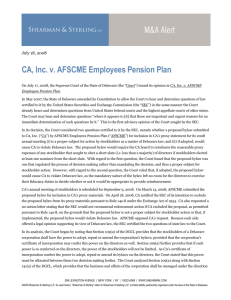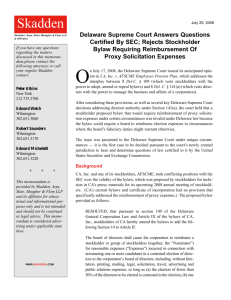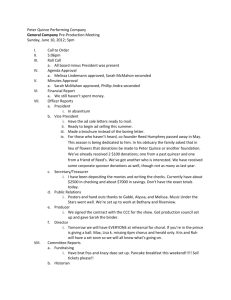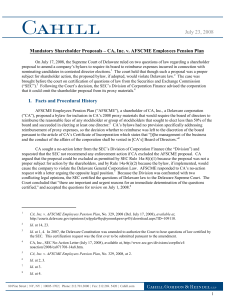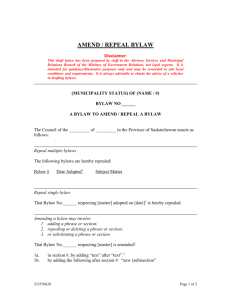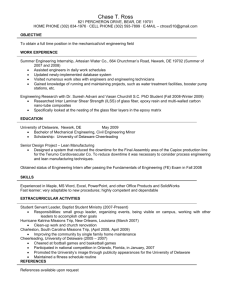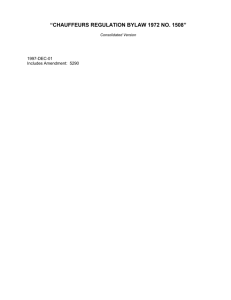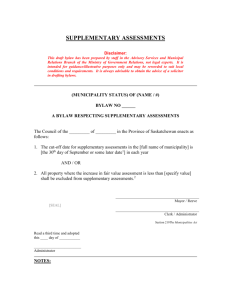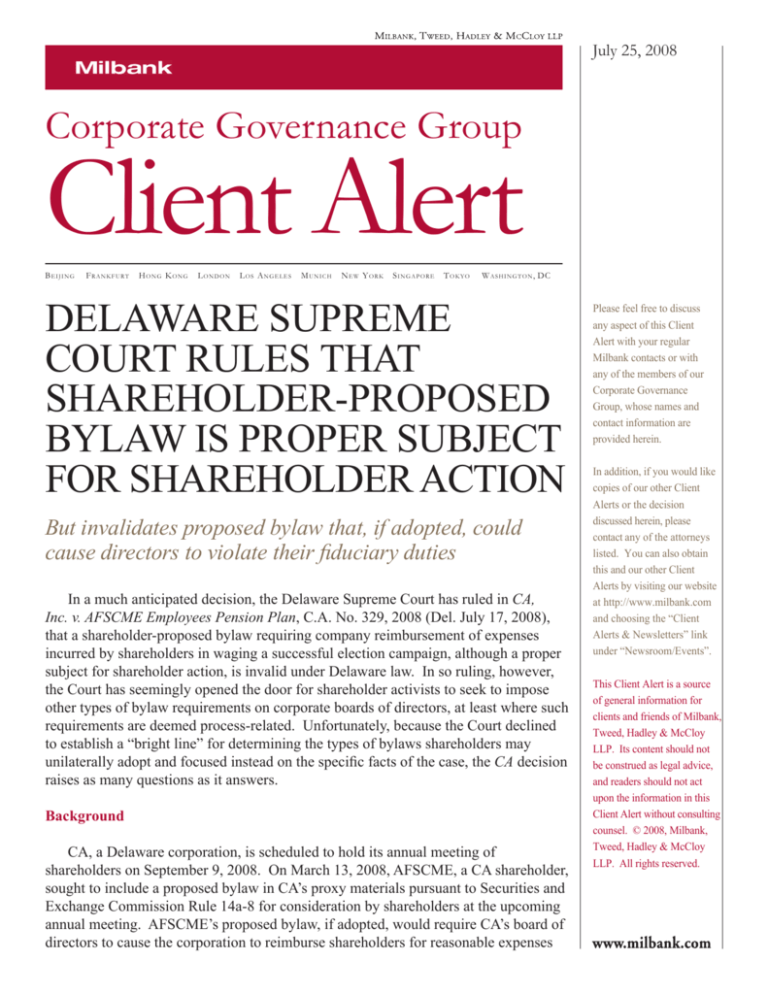
July 25, 2008
Corporate Governance Group
Client Alert
Beijing
Frankfurt
Hong Kong
London
Los Angeles
Munich
New York
Singapore
T o k yo
W a s h i n g t o n , DC
DELAWARE SUPREME
COURT RULES THAT
SHAREHOLDER-PROPOSED
BYLAW IS PROPER SUBJECT
FOR SHAREHOLDER ACTION
But invalidates proposed bylaw that, if adopted, could
cause directors to violate their fiduciary duties
In a much anticipated decision, the Delaware Supreme Court has ruled in CA,
Inc. v. AFSCME Employees Pension Plan, C.A. No. 329, 2008 (Del. July 17, 2008),
that a shareholder-proposed bylaw requiring company reimbursement of expenses
incurred by shareholders in waging a successful election campaign, although a proper
subject for shareholder action, is invalid under Delaware law. In so ruling, however,
the Court has seemingly opened the door for shareholder activists to seek to impose
other types of bylaw requirements on corporate boards of directors, at least where such
requirements are deemed process-related. Unfortunately, because the Court declined
to establish a “bright line” for determining the types of bylaws shareholders may
unilaterally adopt and focused instead on the specific facts of the case, the CA decision
raises as many questions as it answers.
Background
CA, a Delaware corporation, is scheduled to hold its annual meeting of
shareholders on September 9, 2008. On March 13, 2008, AFSCME, a CA shareholder,
sought to include a proposed bylaw in CA’s proxy materials pursuant to Securities and
Exchange Commission Rule 14a-8 for consideration by shareholders at the upcoming
annual meeting. AFSCME’s proposed bylaw, if adopted, would require CA’s board of
directors to cause the corporation to reimburse shareholders for reasonable expenses
Please feel free to discuss
any aspect of this Client
Alert with your regular
Milbank contacts or with
any of the members of our
Corporate Governance
Group, whose names and
contact information are
provided herein.
In addition, if you would like
copies of our other Client
Alerts or the decision
discussed herein, please
contact any of the attorneys
listed. You can also obtain
this and our other Client
Alerts by visiting our website
at http://www.milbank.com
and choosing the “Client
Alerts & Newsletters” link
under “Newsroom/Events”.
This Client Alert is a source
of general information for
clients and friends of Milbank,
Tweed, Hadley & McCloy
LLP. Its content should not
be construed as legal advice,
and readers should not act
upon the information in this
Client Alert without consulting
counsel. © 2008, Milbank,
Tweed, Hadley & McCloy
LLP. All rights reserved.
Corporate Governance Group
incurred in connection with nominating a short slate1 of director-nominees in a contested election of directors,
but only if at least one nominee on the short slate is elected to the board.2
On April 18, 2008, CA sought permission from the SEC’s Division of Corporation Finance to exclude
AFSCME’s proposed bylaw from its 2008 proxy materials. CA attached an opinion from its Delaware counsel
concluding that the proposed bylaw is not a proper subject for shareholder action and that, if implemented,
would violate Delaware law. AFSCME opposed this request in a letter to the SEC on May 21, 2008, attaching a
contrary legal opinion from its Delaware counsel in support of the proposed bylaw.
Seeking to reconcile the two conflicting Delaware legal opinions, the SEC certified the following two
questions to the Delaware Supreme Court3:
1) Is the AFSCME proposal a proper subject for action by shareholders as a matter of Delaware law?
2) Would the AFSCME proposal, if adopted, cause CA to violate any Delaware law to which it is subject?
At the outset, the Court noted that CA’s bylaws are devoid of any provision specifically addressing
reimbursement of shareholder-incurred election expenses. However, a provision in CA’s Certificate of
Incorporation provides, consistent with Section 141(a) of the Delaware General Corporation Law (“DGCL”),
that “[t]he management of the business and the conduct of the affairs of the corporation shall be vested in [CA’s]
Board of Directors.” Thus, in the absence of AFSCME’s proposed bylaw, “the decision whether to reimburse
election expenses is presently vested in the discretion of CA’s board of directors, subject to their fiduciary duties
and applicable Delaware law.”
Next, Justice Jacobs, writing for the Court, discussed the interplay between the rights of directors and
shareholders of Delaware corporations to adopt, amend and repeal bylaws. The Court pointed out that under
Section 109 of the DGCL and CA’s charter documents, both shareholders and the board of directors are given
the right to adopt, amend and repeal bylaws. Because determining how that power is allocated between “those
two decision-making bodies” is “complex”, the Court focused on the language of Section 109 in relation to
Section 141(a), which vests broad management powers in the board of directors. Noting the lack of such broad
management powers in shareholders and that “Section 109(a) does not exist in a vacuum”, the Court observed
that “the shareholders’ statutory power to adopt, amend, or repeal bylaws is not coextensive with the board’s
concurrent power and is limited by the board’s management prerogatives under Section 141(a).” The Court also
observed that Section 109(b) provides that bylaws may contain any provision “not inconsistent with law or with
the certificate of incorporation.” Based upon these observations, the Court framed the ultimate question before
it as: “what is the scope of shareholder action that Section 109(b) permits yet does not improperly intrude upon
the directors’ power to manage corporation’s business and affairs under Section 141(a).”
A “short slate” is a set of shareholder-nominated candidates running for fewer than half the seats on a board of directors.
The proposed bylaw limits the amount to be reimbursed to no greater than the amount expended by CA in connection with such election.
3
This is the first certification of an issue by the SEC to the Delaware Supreme Court since the Delaware constitution was amended to allow for this
procedure in 2007. Previously, Delaware’s high court was only procedurally authorized to accept certified questions of Delaware law from trial
courts in Delaware and federal courts around the country, as well as the high courts of each state. The amendment, as demonstrated by the instant
case, adds a new dynamic to the relationship between the Delaware courts and the SEC.
1
2
2
Corporate Governance Group
First Certified Question
With respect to the first certified question, the Court recited the well-established tenet of Delaware law that
a proper function of bylaws is not to mandate how a board of directors should decide a specific substantive
business decision, but rather, to define the process by which those decisions are made.4 Continuing in this vein,
the Court queried whether the bylaw proposed by AFSCME is one that establishes or regulates a process for
substantive director decision-making, or one that mandates the decision itself.
Upon examination of the specific language of the proposed bylaw, the Court determined that although
AFSCME’s proposed bylaw is couched as a requirement to reimburse, thereby necessitating an expenditure of
corporate funds, it does not thereby “become automatically deprived of its process-related character.” Rather,
applying the “proper function” test described above, the Court found that the primary function of the proposed
bylaw was indeed process-oriented. Acknowledging that the proposed bylaw was “infelicitously couched as a
substantive-sounding mandate”, the Court found that the bylaw had both the intent and effect of regulating “the
process for electing directors – a subject in which shareholders of Delaware corporations have a legitimate and
protected interest.” Accordingly, the Court determined that the proposed bylaw does not violate any provision
of the DGCL or CA’s Certificate of Incorporation is therefore a proper subject for action by shareholders.
Second Certified Question
Turning to the second certified question, the Court reasoned that because Section 109(b) of the DGCL
requires that the bylaw be “not inconsistent with law”, the issue becomes whether AFSCME’s proposed bylaw,
if adopted, would cause CA to “violate any common law rule or precept”. The Court therefore sought to
determine whether the proposed bylaw, under any conceivable set of circumstances, might require the board to
breach its fiduciary duties under Delaware law.
Applying this analysis, the Court found that “the bylaw mandates reimbursement of election expenses
in circumstances that a proper application of fiduciary principles could preclude,” namely a situation where
a proxy contest is motivated by “personal or petty concerns” or to promote interests adverse to those of the
corporation. Although the proposed bylaw contains a reasonableness standard with respect to the amount of the
required expense reimbursement, because “the Bylaw contains no language or provision that would reserve to
CA’s directors their full power to exercise their fiduciary duty to decide whether or not it would be appropriate,
in a specific case, to award reimbursement at all”, the Court determined that AFSCME’s proposed bylaw, “as
written, would violate Delaware law if enacted by CA’s shareholders.”.5
The Court points out examples of the procedural, process-oriented nature of bylaws found in both the DGCL and Delaware case law that do not
improperly encroach upon the board’s managerial authority:
“For example, 8 Del. C. § 141(b) authorizes bylaws that fix the number of directors on the board, the number of directors required
for a quorum (with certain limitations), and the vote requirements for board action. 8 Del. C. § 141(f) authorizes bylaws that
preclude board action without a meeting. And, almost three decades ago this Court upheld a shareholder-enacted bylaw requiring
unanimous board attendance and board approval for any board action, and unanimous ratification of any committee action.”
CA, Inc., C.A. No. 329, 2008 at 13 -14.
5
In this vein, the Court referred to other well-known cases where directors’ fiduciary duties were held paramount to contractual provisions. See
Paramount Communications, Inc. v. QVC Network, Inc., 63 A.2d 34 (Del 1994) (no-shop provision contained in merger agreement); and Quickturn
Design Sys., Inc. v. Shapiro, 721 A.2d 1281 (Del. 1998) (“dead hand” provision in a shareholders rights plan).
4
3
Corporate Governance Group
In this connection, the Court rejected AFSCME’s argument that its proposed bylaw should not be viewed
as impermissibly restricting the ability of the CA board from discharging its fiduciary duty because the effect
of the bylaw would be to “remove the subject of election expense reimbursement … entirely from CA’s
board’s discretion.” The Court made short work of this argument, characterizing it as “more semantical than
substantive.”
Conclusion
The CA opinion is consistent with other recent Delaware decisions holding that shareholders have a
legitimate and protected interest in the director election process, and that shareholder participation therein
will be guarded aggressively by the Delaware courts.6 In fact, by answering the first certified question in the
affirmative, the Court suggested that a properly drafted shareholder-initiated bylaw could be valid even though
it mandated board action. In the words of the Court, “shareholders of a Delaware corporation have the right to
participate in selecting the contestants for election to the board” and “are entitled to facilitate the exercise of that
right by proposing a bylaw that would encourage candidates other than board-sponsored nominees to stand for
election.” Whether the Court would have been as willing to interpret a proposed bylaw dealing with a subject
other than elections of directors as process-oriented, rather than substantive, in nature is an open question. In
addition, the Court’s suggestion that directors may be required to decide, as a matter of their fiduciary duties,
whether to enforce a facially mandatory bylaw is somewhat surprising and raises fundamental questions about
the nature of bylaws.
Moreover, Justice Jacobs emphasized that the Court’s determination with respect to the second certified
question is case specific, leaving open the possibility that a more artfully drafted reimbursement bylaw might
pass muster under Delaware law. One possibility is that the bylaw could have been drafted to include a
“fiduciary out,” which the Court implied may have helped the proposed bylaw survive scrutiny. In any event,
the CA opinion cautions drafters from relying too heavily on the apparent safe harbor provided by “processoriented” drafting. Regardless of how a proposed bylaw is worded, Delaware courts will certainly dissect its
substance to ensure it does not encroach upon the board’s management prerogatives – and its ability to dispose
of its fiduciary duties – under Delaware law. To drive this message home, the CA Court closed its opinion
by stating: “Those who believe that CA’s shareholders should be permitted to make the proposed Bylaw as
drafted part of CA’s governance scheme, have two alternatives. They may seek to amend the Certificate of
Incorporation to include the substance of the Bylaw; or they may seek recourse from the Delaware General
Assembly.”
For instance, Delaware courts have recently interpreted two advance notice bylaws in a manner permitting shareholders to proceed with director
nominations despite missing the deadlines proposed by the bylaws. See our Client Alerts entitled “Recent Chancery Court Ruling Will Require
Delaware Corporations to Re-Examine Their Advance Notice Bylaws” (March 24, 2008); and “Delaware Court of Chancery Again Strictly Construes
Advance Notice Bylaw to Permit “Untimely” Stockholder Proposal” (April 23, 2008).
6
4
Corporate Governance Group
Please feel free to discuss any aspect of this Client Alert with your regular Milbank contacts or with any of the members
of our Corporate Governance Group, whose names and contact information are provided below.
Beijing
Units 05-06, 15th Floor, Tower 2
China Central Place, 79 Jianguo Road, Chaoyang District
Beijing 100025, China
Anthony Root
+86-10-5969-2777
aroot@milbank.com
Edward Sun
+86-10-5969-2772
esun@milbank.com
Frankfurt
Taunusanlage 15
60325 Frankfurt am Main, Germany
Norbert Rieger
+49-69-71914-3453
Hong Kong
3007 Alexandra House, 18 Chater Road
Central, Hong Kong
Anthony Root
+852-2971-4842
Joshua Zimmerman +852-2971-4811
London
10 Gresham Street
London EC2V 7JD, England
Stuart Harray
+44-20-7615-3083
Thomas Siebens
+44-20-7615-3034
nrieger@milbank.com
aroot@milbank.com
jzimmerman@milbank.com
sharray@milbank.com
tsiebens@milbank.com
Los Angeles
601 South Figueroa Street
Los Angeles, CA 90017
Ken Baronsky
+1-213-892-4333
Neil Wertlieb
+1-213-892-4410
kbaronsky@milbank.com
nwertlieb@milbank.com
Munich
Maximilianstrasse 15 (Maximilianhoefe)
80539 Munich, Germany
Peter Nussbaum
+49-89-25559-3636
pnussbaum@milbank.com
New York
One Chase Manhattan Plaza
New York, NY 10005
Scott Edelman
+1-212-530-5149
Roland Hlawaty
+1-212-530-5735
Thomas Janson
+1-212-530-5921
Robert Reder
+1-212-530-5680
Alan Stone
+1-212-530-5285
Douglas Tanner
+1-212-530-5505
sedelman@milbank.com
rhlawaty@milbank.com
tjanson@milbank.com
rreder@milbank.com
astone@milbank.com
dtanner@milbank.com
Singapore
30 Raffles Place, #14-00 Chevron House
Singapore 048622
David Zemans
+65-6428-2555 Naomi Ishikawa
+65-6428-2525 dzemans@milbank.com
nishikawa@milbank.com
Tokyo
21F Midtown Tower, 9-7-1 Akasaka, Minato-ku
Tokyo 107-6221 Japan
Darrel Holstein
+813-5410-2841
dholstein@milbank.com
Bradley Edmister +813-5410-2843
edmister@milbank.com
Washington, DC
International Square Building, 1850 K Street
Washington, DC 20006
Glenn Gerstell
+202-835-7585
gerstell@milbank.com
5

